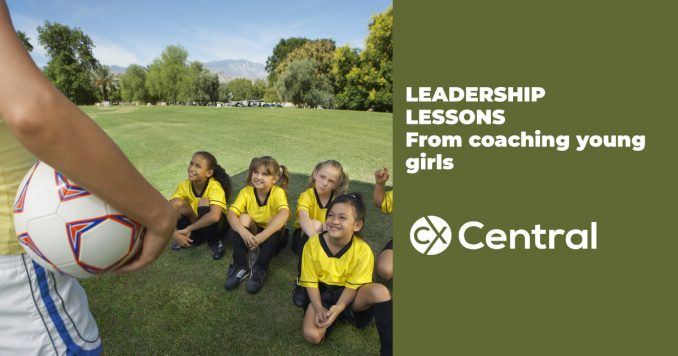
From the editor: Whilst this article on how to coach young girls was written for the sporting arena, there are some great coaching/leadership tips that apply to both sport and the workplace.
Regardless of whether its coaching boys and girls, men and woman, there are some fundamentals of coaching that all environments share.
In fact, there are lots of parallels between work and sport and Nathan Burke, former AFL Legend and now coach of the Western Bulldogs AFLW team, has plenty of experience on the sporting field and as a senior leader in a contact centre.
And with many of our parents helping out to coach children’s sport across the country, even if you only get one leadership tip for the workplace, hopefully, you will also pick up some ideas for the managing the kids.
How to coach young girls
When I say coaching girls is different from coaching boys most people respond with ‘of course it is, Captain Obvious’.
But it’s amazing how many well-credentialed (on paper at least) coaches fail to change their approach based on the gender of their players.
The fact is youth girls are different to youth boys and treating them the same is a major reason why the drop out rate for girls is 6 times higher than boys (according to research undertaken by U.S based Positive Coaching Alliance)
The following is a list of the key differences between boys and girls.
It is important to note that these are generalisations, and there will always be exceptions to the rules.
However, as a coach of females, this must be your starting point until you get to know your players intimately.
Because if you don’t, you risk turning them away from sport altogether.
8 Tips on how to coach young girls
1. Young girls are more likely to insist on fairness
They don’t easily reconcile with injustice and notice favouritism readily.
Boys may say it is ok to favour the good players, but girls won’t tolerate it.
An even playing ground is vital.
Information must be shared with all players, training available to all players and importantly time spent with all players.
2. Young girls hate to be played off against their peers
I don’t know any females young or old who enjoy being compared to other females.
Challenging them with comments like “Kate has your position now” or “Kate would’ve kicked that goal” serve only to demoralise, not inspire.
Making comparisons especially doesn’t work for sisters. Brothers may go hell for leather to beat the other, but girls who get a position over their sister are far more likely to feel upset for the sister rather than joy for themselves.
Playing one sister against the other will simply turn both off you as a coach, or worse drive one away from the sport. It may force them to change the way they play and will most certainly not bring out the best in either girl.
3. Young girls are sensitive to changes in your body language and changes in your relationship with them
This includes grumpy looks, throwing your arms in the air after a mistake or simply going several sessions without talking to them.
Girls are often more concerned with how you say things rather than what you say. Body language and the tone of your voice are important as a girl will not have fun with a coach they think doesn’t like them.
Girls notice the small stuff and it can drastically affect their confidence.
They want to be liked by their coach as a person and if they feel liked they will give their all for you.
4. Young girls need to hear the whole story
If you demote a player, bench them, train them with a different group or change their position without telling them why, they will assume the worst.
They will make up their own story and it will rarely be right.
When the parents add in their version of the story the situation becomes increasingly confusing.
Younger ones especially don’t have the wisdom to understand coaching motives or tactics and are therefore likely to think negatively.
Over communication must be your mantra.
A coach who assumes players know the reasons behind their decisions is a fool.
5. Young girls are more likely to internalise criticism
Boys may deflect criticism onto the team, but girls will stew on it for days or weeks.
Expecting them to just get over it won’t happen. Never single out girls for criticism in front of their peers because you will turn that girl off and most likely others who hear it.
Girls are more sensitive and asking them to leave their problems at the door won’t work.
A good coach will notice changes in demeanour and if the player is strong enough to bring the matter to you, then you have to applaud their courage, then treat what they say and ‘feel’ seriously.
To dismiss their feelings, even if they are not based on fact, is to dismiss the person.
6. Young girls need to be taught that mistakes are OK
Girls are naturally more likely to avoid embarrassing situations than boys.
They are less likely to take risks and potentially look silly, especially if you are a coach who publicly yells or constantly points out mistakes.
Mistakes are learning opportunities and a coach who points them out without offering solutions is not actually a coach.
7. Young girls are more likely to form cliques and ostracise outsiders
You must keep a vigilant eye on the demeanour of your players and notice any subtle changes.
Do they seem less happy than previously? Are they coming to training less often? If you notice something you have to act before it spirals out of control.
Many coaches ‘choose’ the easy option which is to pretend not to notice.
8. Young girls are more sensitive to body image than boys
Off the cuff comments about size or athletic ability can cut deep.
You need to understand that there will be tears as girls are more likely to cry and express their emotions.
It isn’t a sign of weakness; it just shows they care.
And any coach who disregards the effects of period pain on his players has his head in the sand.
It’s real, it can be debilitating… so try empathy rather than ignorance or derision.
In Summary
A coach who does the above well will find coaching females could be the most rewarding experience of their coaching career.
Many who have changed from boys to girls say they will never go back.
However, if you can’t do the above then I recommend you not put your hand up to coach girls; and maybe even think about not coaching boys either for that matter.
Coaching is more than developing skills and game strategies.
It is also about motivating and getting the best out of people.
As a coach, it must be about ALL your players and the TEAM …not YOU.
Recommended further reading: 5 Powerful tips to improve your coaching skills
Search a list of all the upcoming industry training courses and conferences on the Industry Events Calendar >>>


Be the first to comment